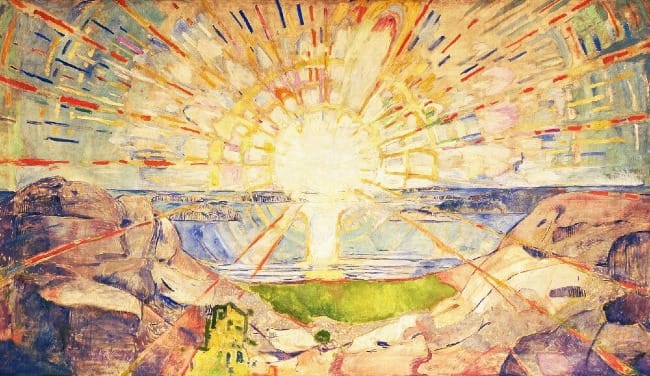
Although most of us have grown beyond a young child's self-absorbed shout of, "Mine! All mine!" I'm not sure we have been entirely cured of this view of the world. "Ours! All ours!" is often an undergirder of daily life and whether that "ours" is a family group, a nation, or even all of humanity, "Ours! All ours!" denies that the place and the need of the "other" is as important as the place and need of "mine" or "ours." Christians can be particularly susceptible to this stance when leaning on a view of creation in which humanity is the only part of creation with true significance. St. Francis' Canticle of the Creatures raises important questions such as, "Am I, is humanity, really the center of the universe, the apex of creation?"
Canticle of the Creatures
by St. Francis of Assisi (born 1181/82, Assisi, Italy—died October 3, 1226, founder of the Franciscan orders of the Friars Minor, the women’s Order of St. Clare, and the lay Third Order).
Most high, all powerful, all good Lord!
All praise is Yours, all glory, all honor, and all blessing.
To You, alone, Most High, do they belong.
No mortal lips are worthy to pronounce Your name.
Be praised, my Lord, through all Your creatures,
especially through my lord Brother Sun,
who brings the day; and You give light through him.
And he is beautiful and radiant in all his splendor!
Of You, Most High, he bears the likeness.
Be praised, my Lord, through Sister Moon and the stars;
in the heavens You have made them (in celu L'ài formate) bright, precious and beautiful.
Be praised, my Lord, through Brothers Wind and Air,
and clouds and storms, and all the weather,
through which You give Your creatures sustenance.
Be praised, my Lord, through Sister Water;
she is very useful, and humble, and precious, and pure.
Be praised, my Lord, through Brother Fire,
through whom You brighten the night.
He is beautiful and cheerful, and powerful and strong.
Be praised, my Lord, through our sister Mother Earth,
who feeds us and rules us,
and produces various fruits with colored flowers and herbs.
Be praised, my Lord, through those who forgive for love of You;
through those who endure sickness and trial.
Happy those who endure in peace,
for by You, Most High, they will be crowned.
Be praised, my Lord, through our sister Bodily Death,
from whose embrace no living person can escape.
Woe to those who die in mortal sin!
Happy those she finds doing Your most holy will.
The second death can do no harm to them.
Praise and bless my Lord, and give thanks,
and serve Him with great humility.
This canticle (song) can be challenging. For starters, it questions the assumption that humans are set apart from the rest of creation as the sole image-bearers of God. In its verses, it is "Brother Sun" who bears a likeness to God, giving light to all other creatures. By using relational names: Brother Sun, Sister Moon, Brother Wind, sister Mother Earth, the listed creatures (created things) are presented as our siblings, not merely repositories of resources for us to do with as we wish. They are God's, not ours, and as creatures of God, they give him glory, apart from their usefulness to us in particular. As Psalm 66:4 says, “All the earth worships you and sings praises to you; they sing praises to your name.”
These elder siblings of ours are also, to put it bluntly, more necessary to the continuance of life than we are, and our relationship to them is primarily as beneficiaries of their gifts. We cannot provide light; we cannot bear fruit; we cannot produce water. We are younger siblings, with the ability to mess things up if we have a childish "all mine" attitude or, alternatively, with the ability to respect and care for these other creatures, but our place is perhaps not as central or as important as we would like to believe. It is time to remember our creatureliness and to bump other parts of creation up on our mental scale of importance and bump ourselves down a bit. To achieve this posture of humility, we could start by acknowledging the special attributes of these other creatures, such as "sister Mother Earth who feeds us and rules us. " Worth considering also is whether Sister Water's praise of God is as clear as or even clearer than our own. These parts of the creation do what they were made to do—do I?
As I sit here writing this from a family cabin on Puget Sound, I am watching sailboats float in the nearby harbor, waiting for the wind to come. The sailboats and those who sail them cannot create wind or control how hard it blows or which direction it comes from. They can only adapt themselves to the wind that comes. We are dependent upon creatures greater than ourselves. It is necessary to know that truth; it is good to acknowledge that truth, and it is a blessing to praise that truth.
Amen.
Louise

In what way(s) might "Brother Sun" bear the likeness of God? Does thinking of these other creatures as siblings make you uncomfortable? If you think of them in those terms, how might it change the way you interact to them?
THREE WAYS TO RESPOND:
- COMMENT - we would love to hear from you.
- SUBSCRIBE to get posts directly to your email twice a week (it's free).
- SHARE through email or social media.
You can also contact me directly at info@circlewood.online.